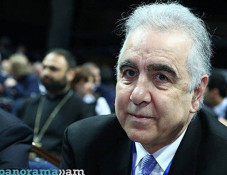
Resolution condemning Azerbaijan's Artsakh blockade introduced in U.S. Senate
U.S. Senators Alex Padilla (D-Calif.) and Marco Rubio (R-Fla.) have introduced a bipartisan Senate resolution condemning Azerbaijan for its blockade of the Lachin Corridor and urging the United States to take immediate steps to end the ongoing humanitarian crisis.
The resolution was also introduced in the U.S. House of Representatives by Congressman Frank Pallone, Jr (D-N.J.-06) and is cosponsored by Senator Bob Menendez (D-N.J.), Chairman of the Senate Foreign Relations Committee.
"Azerbaijan’s blockade of Nagorno-Karabakh has left 100K+ Armenians without access to basic necessities. It's inhumane—and it's unacceptable," Senator Padilla said in a tweet. "That's why I just introduced a bipartisan resolution condemning this blockade and urging the United States to take action now."
In addition to clearly and unequivocally condemning Azerbaijan’s six-month blockade, the resolution would place the U.S. Senate on record in favor of five practical remedies to the worsening humanitarian crisis in Artsakh caused by Azerbaijan’s blockade of food, medicine, and other vital necessities:
(1) Encourages the United States Government and international community to petition the United Nations Security Council, the Organization for Security and Co-operation in Europe, and other appropriate international bodies to investigate any and all war crimes committed by Azerbaijani forces against Armenian civilians;
(2) calls for the deployment of international observers to the Lachin Corridor and Nagorno-Karabakh to explore opportunities for more effective and sustainable guarantees of security and peaceful development.
(3) calls on the President to immediately suspend any U.S. new, current, or pending military or security assistance to Azerbaijan, and to fully enforce Section 907 of the FREEDOM Support Act;
(4) supports U.S. sanctions under existing statutory authority against Azerbaijani officials responsible for the blockade of Nagorno-Karabakh and other well-documented human rights violations committed against Armenians in the region such as the targeting of civilian infrastructure and the destruction of historic, cultural, and places of worship of great significance to Armenians;
(5) supports efforts by the United States, the European Union, and the international community to provide humanitarian assistance to victims of Azerbaijani aggression in Nagorno-Karabakh.
Related news
Newsfeed
Videos






























